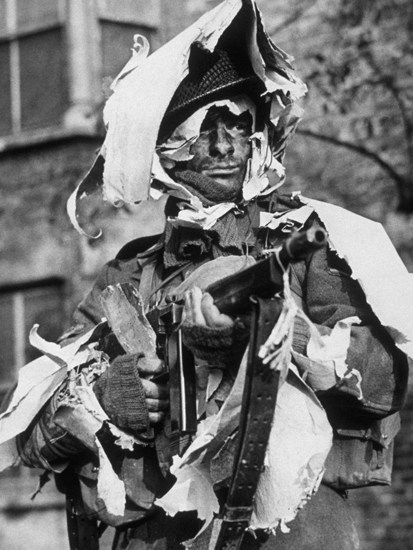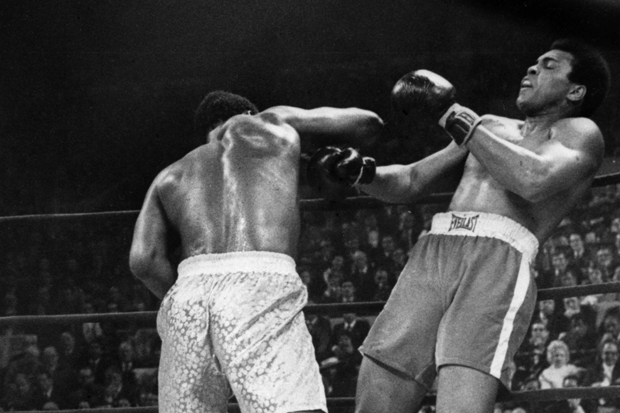Dad’s Army, the sitcom to end all sitcoms, portrayed the Home Guard as often doddery veterans. In one episode, Private Godfrey’s genteel sisters are seen to prepare their Regency cottage for the feared Hitler invasion. ‘The Germans are coming, Miss Godfrey,’ Lance Corporal Jones warns. ‘Yes I know, so many people to tea,’ she chirrups, adding: ‘I think I’d better make some more.’ In contrast to Godfrey, the sitcom’s street-smart spiv Joe Walker could be relied on to come up with the goods. In his rakish trilby indeed he supplies the platoon with contraband cigarettes and is familiar with the legendary backs of lorries what things fall off of.
Leo McKinstry, in his pacey account of Hitler’s plan to invade Britain, tells us that Home Guard recruits were usually of a certain age. The oldest recorded volunteer, at 78, had taken part in the campaign to relieve General Gordon in 1885. Still many of them helped to man Britain’s Maginot-like anti-invasion defences along the south coast with their pillboxes, anti-tank obstacles, roadblocks and gun-emplacements. Hitler’s long-awaited assault in 1940 was not foiled by the RAF alone, says McKinstry; the resistance involved the home front too.
The story has been told many times before. Operation Sealion, Nazi Germany’s plan to overrun Britain following the fall of France in July 1940, required both air and naval superiority over the Channel. Hitler achieved neither. Numerically, the German Navy was inferior to the Royal Navy and Hitler had no specialised landing craft. On 17 September 1940 he therefore postponed his plan indefinitely and turned his eye instead to the Eastern Front.
Had it succeeded, Operation Sealion would have involved the liquidation of British Jewry and implementation of breeding programmes to augment Aryan herrenvolk. (Scotland was judged to have a suitably large number of Nordic-type women.) In addition, Nelson’s column would have been removed to Berlin and the Hitler-friendly Edward VIII (a ‘petulant baby’, Churchill reckoned) would have been restored to the British throne. Or so some historians have maintained.
McKinstry, a Daily Express columnist, argues convincingly that Germany needed first to gain air superiority before a seaborne assault could be launched. The August 1940 Battle of Britain (as it became known) dealt a blow to Sealion. Churchill had already rounded up all suspected pro-Nazis resident in Britain. The British Union of Fascists under the leadership of Sir Oswald Mosley had relied on bludgeons and intimidation for support. Yet most British fascists were not Jew-baiters, and found Hitler’s biological anti-Semitism distasteful. By July 1940 some 747 Mosleyites and other ‘right-wing extremists’ had nevertheless been interned across Britain, writes McKinstry.
If British fascism failed at this moment to draw support from the British public it was partly because parliamentary democracy was seen to work very well in the face of a national crisis — albeit, under Churchill, with a stiff authoritarian streak. The prime minister’s Silent Column campaign, approved by the Ministry of Information on 8 July, allowed the state to listen in on private conversations and threatened to turn Britain into a nation of spies. (‘We hate it beyond all imagination,’ Dorothy L. Sayers fumed in an article for The Spectator.)
In the face of the invasion the British authorities were ‘ruthless’, says McKinstry. Civil liberties went by the wayside as Bletchley decrypts and other intelligence reports carried information on fifth columnists. Ultimately, Hitler’s preparations to invade were in vain and, after his defeat in the Battle of Britain, pretty well dead in the water. McKinstry’s book, while not exactly ground-breaking, provides a readable history of Britain’s resistance to the bogeyman across the Channel.
Got something to add? Join the discussion and comment below.
Get 10 issues for just $10
Subscribe to The Spectator Australia today for the next 10 magazine issues, plus full online access, for just $10.
Available from the Spectator Bookshop, £20. Tel: 08430 600033
You might disagree with half of it, but you’ll enjoy reading all of it. Try your first month for free, then just $2 a week for the remainder of your first year.














Comments
Don't miss out
Join the conversation with other Spectator Australia readers. Subscribe to leave a comment.
SUBSCRIBEAlready a subscriber? Log in